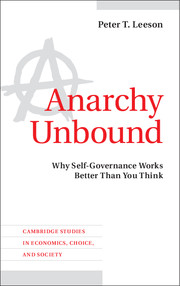Book contents
1 - Anarchy Unbound
Published online by Cambridge University Press: 05 February 2015
Summary
This book consists of several essays. Their central argument is simple: anarchy works better than you think.
My thesis sets a low argumentative bar. If you're like most people, you don't think anarchy works at all. Such readers are in good company. One of the most important figures in the history of social thought, Thomas Hobbes, shared that thinking.
In 1651 Hobbes famously described life in anarchy as “solitary, poor, nasty, brutish, and short.” His reasoning is familiar. In anarchy, property is unprotected: there’s nothing to prevent the strong from plundering the eak, the unscrupulous from bamboozling the unwitting, and the dishonest from defrauding the honest. There’s no social cooperation, only social conflict, no civilization, only chaos.
Hobbes’s path out of this anarchic jungle was government. By making and enforcing rules that protect individuals’ property, he argued, government will create social harmony. Indeed, government will create society.
Hobbes was wrong – on both counts. Individuals have secured property protection and social cooperation without government and still do. Moreover, in much of the world, government has proved to be the greatest depredator of property rights, creator of conflict, and instigator of chaos, rather than an innocuous antidote to anarchic afflictions.
- Type
- Chapter
- Information
- Anarchy UnboundWhy Self-Governance Works Better Than You Think, pp. 1 - 12Publisher: Cambridge University PressPrint publication year: 2014
- 1
- Cited by



